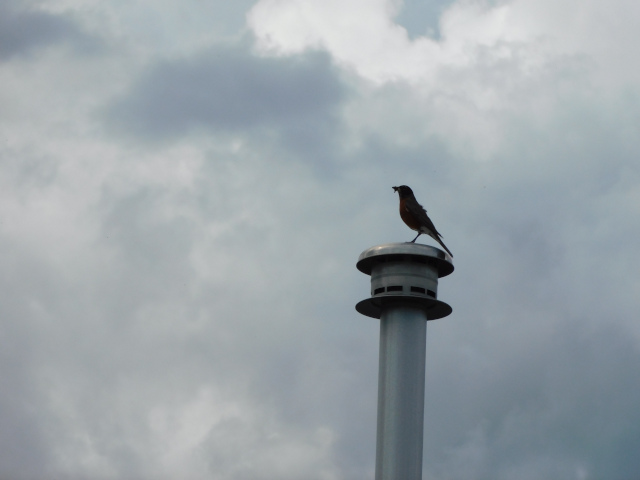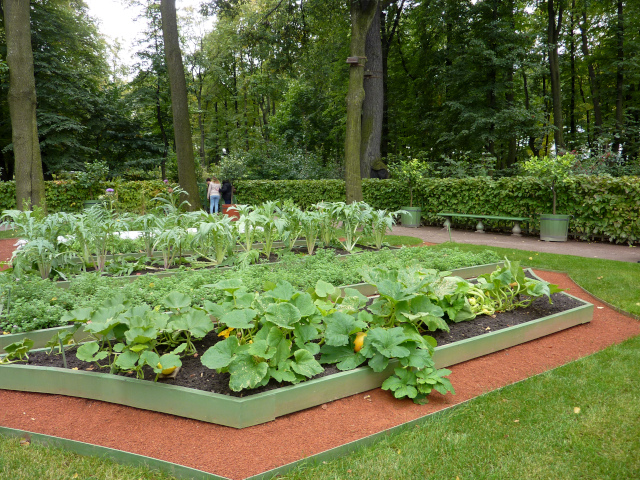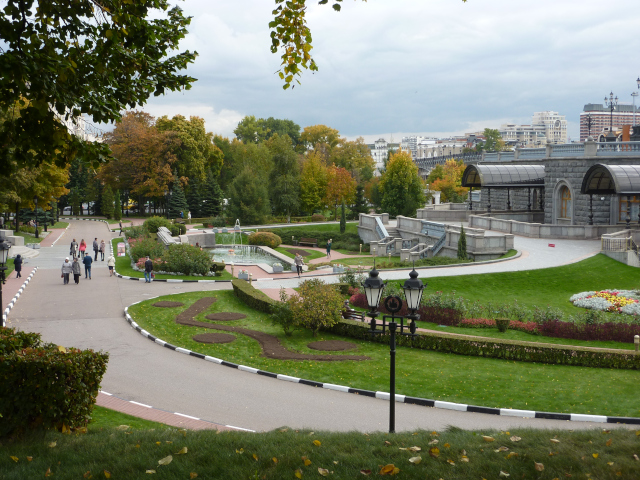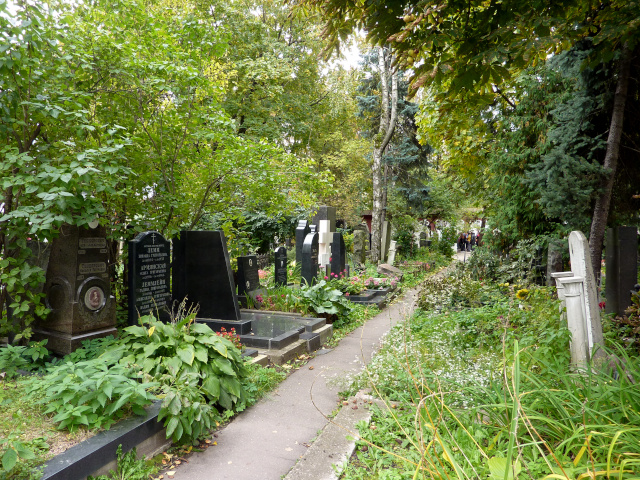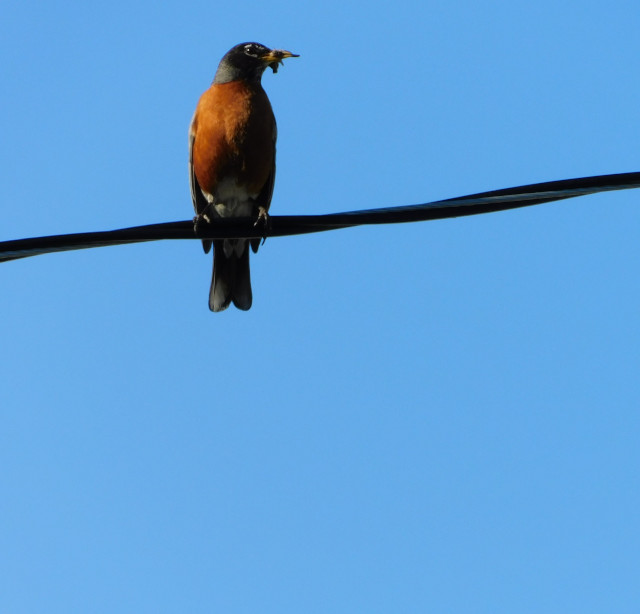
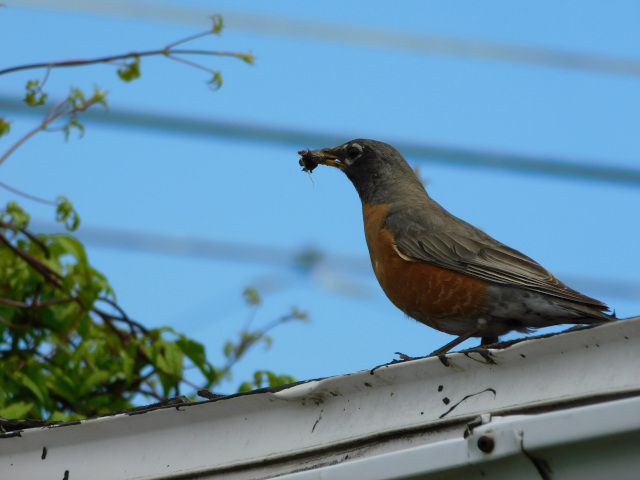
This robin “with no Christian name” (see poem below) and his equally nameless mate have built a nest in the clematis vine that shields our patio from the eastern sun and from the curious gaze of passers-by in the back alley. Its density shields the nest just as well from our curious gaze. Our use of the patio will be limited until the young ones begin flying about. Until that time, our garden and lawn serve as an ever-available worm buffet for the growing robin family.

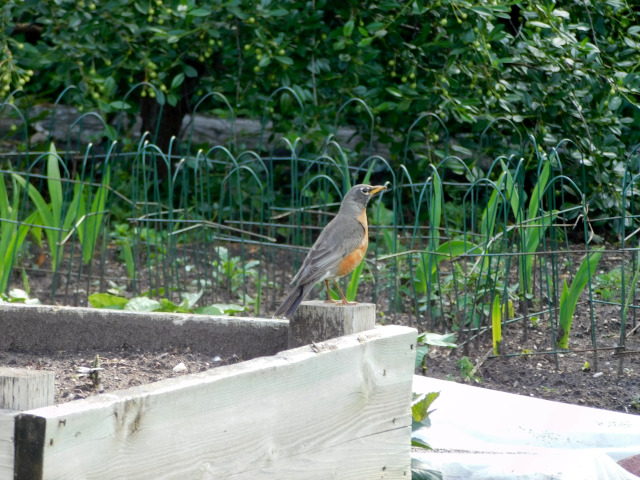
In a quixotic, synaptic move, my brain put together my ongoing fretting about discourse (gentle and otherwise), the happily singing robins, and a poem by W.H. Auden – “Their Lonely Betters.” Many years ago, that poem grabbed my attention and eventually prompted me to write a conference paper about language, pretentiously titled “The Morality of Grammar.” Back then, I was much exercised about the changing usage of pronouns. My students were persistently using I rather than me in all the “wrong” places, and I was busy justifying to myself, and to anyone who would listen, my belief that that change was a bad idea.
That change from me to I now seems a small issue pointlessly pursued in an innocent time, when civility in public discourse could generally be expected, and lies, when exposed, brought suitable disgrace to public figures. I had not yet even heard about disinformation nor understood the power that social media would gain in the not too distant future.
Auden’s poem, however, has not become irrelevant. If anything, it is more to the point than ever:
Their Lonely Betters
by W. H. Auden
As I listened from a beach-chair in the shade
To all the noises that my garden made,
It seemed to me only proper that words
Should be withheld from vegetables and birds
A robin with no Christian name ran through
The Robin-Anthem which was all it knew,
And rustling flowers for some third party waited
To say which pairs, if any, should get mated.
Not one of them was capable of lying,
There was not one which knew that it was dying
Or could have with a rhythm or a rhyme
Assumed responsibility for time.
Let them leave language to their lonely betters
Who count some days and long for certain letters;
We, too, make noises when we laugh or weep:
Words are for those with promises to keep.
1950
It’s a charming picture, is it not? – the poet relaxed in his chair in the garden. Who would not likewise enjoy listening to the sounds of the garden? And who, like the poet, has not longed for letters (or texts or emails) or for certain days to arrive? Which of us has not laughed (a kind of song without a name) or wept (a kind of disturbed inward rustling)? Seemingly alone in his garden, the poet can allude to some painful loss and yet achieve an emotional distance that allows for philosophical speculation.
What have words to do with all of this? This longing for certain days, this loneliness that is not dispelled by the desired letter (which hasn’t arrived)? It is easy to conclude at first that the poet is crying inside for his “mate” who isn’t there and might not ever be there. Some kind of promise has been made, in words, which has not been kept.
But the penultimate stanza moves the moment of reflective loneliness in the garden to a broader context. It takes words to tell a lie, and it takes words to articulate the awareness of mortality. Yes, both misinformation and death can be acknowledged through gestures, postures, facial expressions – what we revealingly call “body language.” But there’s more going on here than just emotionally registering loss, of whatever kind. Auden’s deft phrase, “with a rhythm or a rhyme assumed responsibility for time,” underscores the troublesome gift of self-consciousness that is the foundation of human language: words (the speaking aloud of the human capacity for self-awareness) are the articulation of promises.
With words, we promise not only to keep our appointments, to carry out actions, and to listen, but also to understand, to share perceptions, to honor commitments, to keep alive the community that benefits us all. Words depend on the character of their speakers for their informational power and their ability to set consequences in motion. Through words we signal “this is who I am and this is how I will act.” Without promises being kept, whether made implicitly or explicitly, there is no trust. Without trust, Auden insists, we may be still be “better” (a slippery word that here seems to mean “of higher status”) than robins, but we will be lonely. As soon as we move beyond the noise of emotions, we need words, words that can be depended on.
So let there be not only gentle discourse but what’s more, a discourse of trust. Broken promises are inevitable among fallible humans who are not always in control of their circumstances; nevertheless, we can “take responsibility” for our brokenness and seek to make amends. Words – and people – deserve at least that much.
